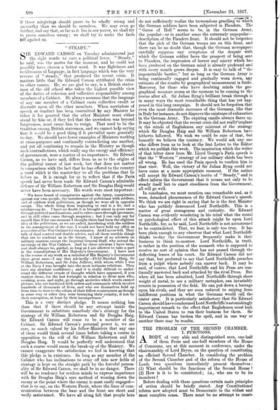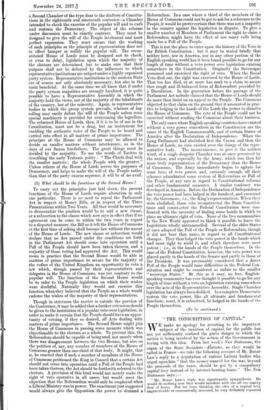THE PROBLEM OF THE SECOND CHAMBER. T. FUNCTIONS.
ABODY of very able and distinguished men, one-half of them Peers and one-half members of the House of Commons, are at this moment in conference, under the chairmanship. of Lord Bryce, on the question of constituting an efficient Second Chamber. In considering the problem of the Second Chamber and of the reform of the House of Lords two questions immediately present themselves :
(1) What should be the functions of the Second House ?
(2) How is it to be constituted ; i.e., who are to be its members ?
Before dealing with these questions certain main principles of action should be briefly stated. Any Constitutional reform now adopted must be Democratic in the widest and most complete sense. There must be no attempt to create
n Second Chamber of the type dear to the drafters.of Constitu- tions in the eighteenth and nineteenth centuries—a Chamber intended to check the exercise of the popular will and to curb and restrain the Democracy. The object of the reforms under discussion must be exactly contrary. They mast be designed to give the will of the People its clearest and most perfect expression. They must ensure that the working of such principles as the principle of representation does not in effect hamper or nullify the popular will. The recon- stituted House of Lords must be designed not to check, or even to delay, legislation upon which the majority of the electors are determined, but to make sure that their purpose shall not be defeated by the influences to which representative institutions are subjectunder a highly organized party system. Representative institutions in the modern State are of course not only absolutely necessary, but also in the main beneficial. At the same time we all know that if under the party system majorities are strongly localized, it is quite possible to have a Representative Assembly in which the majority hold the views, not of the majority of the inhabitants of the country, but of the minority. Again, in representative bodies in which the group system prevails, schemes of log- rolling may easily defeat the will of the People unless some special machinery is provided for overcoming the logrollers. The reformed House of Lords, then, if it is to be of use in the Constitution, must not be a drag, but an instrument for enabling the authentic voice of the People to be heard and carried into effect in all matters of prime importance. The principes of the House of Commons may be allowed to decide on smaller matters without interference, as in the days of our Saxon forefathers. The great things must be decided by the majority. To use the words of Tacitus in describing the early Teutonic polity " The Chiefs deal with the smaller matters ; the whole l'eople with the greater." Unless reform of the House of Lords serves the purposes of Democracy, and helps to make the will of the People rather than that of the party caucus supreme, it will be of no avail.
(1) What should be the functions of the Second House?
To carry out the principles just laid down, the present functions of the House of Lords require alteration in only one particular. There is no need to repeal the Parliament Act in respect of Money Bills, or in respect of the Three Presentations within Two Years. All that would be necessary to democratize the position would be to add a new clause, or a subsection to the clause which now says in effect that if no agreement can be come to within the two years in regard to a disputed measure, the Bill as it left the House of Commons at the first time of asking shall become law without the assent of the House of Lords. The new clause or subsection would declare that no Act passed under the conditions set forth in the Parliament Act should come into operation until a Poll of the People should have been taken thereon, and a majority of those voting had approved the Act. This would mean in practice that the Second House would be able in matters of prime importance to secure for the majority of the voters of the United Kingdom an opportunity to veto a law which, though passed by their representatives and delegates in the House of Commons, was yet contrary to the popular will. The function of the Second House would he to refer to the People legislation on which their wishes were doubtful. Naturally they would not exercise this 'function when they believed that the People as a whole would endorse the wishes of the majority of their representatives.
Though in strictness the matter is outside the purview of the Conference, it may beadded that &further extension should be given to the institution of a popular veto overlegislation, in order .to make it certain that the People should have an oppor- tunity of vetoing, if they so desired, all Acts dealing with matters of prime importance. The Second House might join the House of Commons in passing some measure which was objectionable to the electors as a whole. To prevent this, the Referendum should be capable of being used, not merely when there was disagreement between the two Houses, but also on the petition of, say, any number of members of the House of Commons greater than one-third of that body it might, that is, be enacted that if such a number of members of the House of Commons petitioned the King in Council that a certain Act should not come into operation until a Poll of the People had been taken thereon,the Act should be forthwith referred to the electors. A provision of this kind would not merely make the right of veto operative in all cases, but would meet the objection that the Referendum would only be employed when a Liberal Ministry was in power. The enactment just suggested would always give the Opposition the power to demand a
Referendum. Ina case where it third of the members of the House of Commons could not be got to ask for a refereneeto the People, it would be pretty certain that there was not a majority in the country against the legislation in dispute. To give a smaller number of Members of Parliament the right to claim a Referendum might have the effect of too many calla being made for a Poll of the People.
This is not the place to enter upon the history of the Veto in the British Constitution ; but it may be stated briefly that neither here, nor in America, nor in any other portion of the English-speaking world has it been found possible to go for any length of time without a veto power over legislation existing somewhere in the Constitution. Originally the Sovereigns possessed and exercised the right of veto. When the Royal Veto died out, the right was exercised by the House of Lords. That too has died, or at most has sunk to a claim to secure that rough and ill-balanced form of Referendum provided by a Dissolution. In the generation before the passage of the Parliament Act nobody claimed that the House of Lords should do more than insist on an appeal to the People. The Commons objected to that claim on the ground that it amounted in prac- tice to lodging in the hands of the Lords the power to dissolve the House of Commons. The veto of the People could not be exercised without sending the Commons about their business.
The only cases where English-speaking countries have existed without a veto power somewhere in the Constitution are the cases of the English Commonwealth, and of certain States of America after the Declaration of Independence. When the Long Parliament had abolished first the Crown and then the House of Lords, no veto existed over the doings of the repre- sentative body. The inconvenience, to give it the mildest word, of a single despotic Chamber was at once perceived by the nation, and especially by the Army, which was then far more truly representative of the Democracy than the House of Commons. The Army immediately began to agitate for some Iona of veto power, and, curiously enough, all their schemes adumbrated some system of Referendum or Poll of the People, at any rate in regard to Constitutional reforms and other fundamental measures. A similar tendency was developed in America. Before the Declaration of Independence the veto power had been lodged in the hands of, and exercised by, the Governors; i.e., the King's representatives. When they were abolished, those who reconstructed the State Constitu- tions and constracted the Federal Constitution were con- fronted with the necessity of finding some hands in which to place an ultimate right of veto. None of the free communities in the New World appeared to think it possible to leave the Legislature wholly untrammelled. Several of the older States at once adopted the Poll of the People or Referendum, though it did not bear that name, in regard to all Constitutional changes. They thus lodged the veto power in the hands which had most right to wield it, and which therefore were most potent ; i.e., in the hands of the People themselves. In the case of the Federal Constitution, however, the veto power was placed partly in the hands of the Senate and partly in those of the President. It was presumably considered that a direct Poll of the People would raise difficulties in the Federal Con- stitution and might be considered as unfair to the smaller "sovereign States." Be this as it may, no free, English- speaking community has ever thought it possible to go for any length of time without a veto on legislation existing somewhere over the acts of the Representative Assembly. Single Chamber legislation has always been disliked. Ina complete Democratic system the veto power, like all ultimate and fundamental functions, must, it is submitted, be lodged in the hands of the People themselves. (To be continued.)







































 Previous page
Previous page